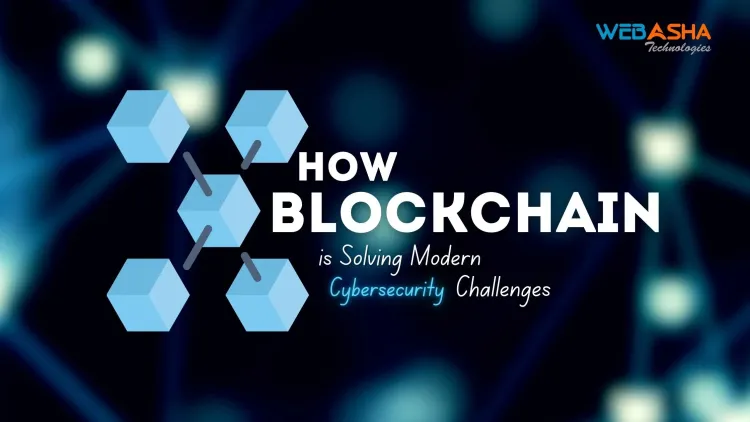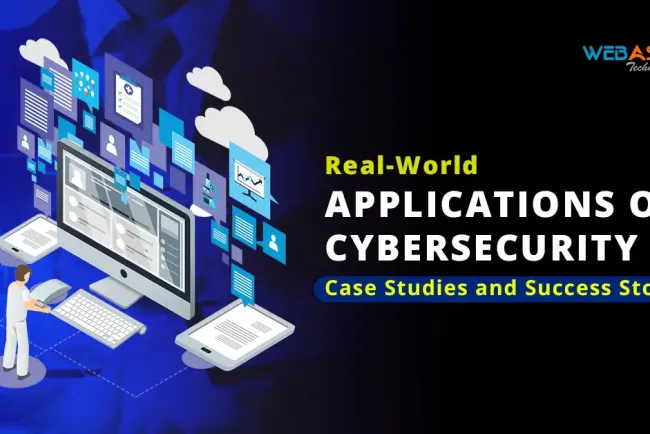How Blockchain is Solving Modern Cybersecurity Challenges
Discover how blockchain technology is revolutionizing cybersecurity by providing enhanced data security, preventing breaches, securing IoT devices, and addressing modern cyber threats effectively.

Introduction
Cybersecurity challenges have evolved, with threats like data breaches, identity theft, and ransomware attacks becoming more sophisticated. Blockchain, a decentralized and tamper-proof technology, is emerging as a robust solution to these challenges. By leveraging its core principles transparency, immutability, and decentralization blockchain is redefining how organizations secure their digital ecosystems.
1. Understanding Blockchain in Cybersecurity
At its core, blockchain is a distributed ledger that records transactions across multiple nodes. Unlike traditional databases, blockchain’s decentralized nature ensures that no single point of failure exists, making it highly resilient to cyberattacks. Data stored on a blockchain is encrypted and immutable, providing a secure foundation for modern cybersecurity strategies.
2. Key Applications of Blockchain in Cybersecurity
The key applications of blockchain in cybersecurity are:-
| Application | Description |
|---|---|
| Securing Data Integrity | Blockchain ensures data immutability, preventing unauthorized modifications to sensitive information. |
| Enhancing Identity Management | Blockchain enables decentralized identity systems, reducing risks of identity theft and fraud. |
| Protecting IoT Networks | Blockchain secures IoT devices by providing tamper-proof communication channels and authentication. |
| Mitigating DDoS Attacks | Decentralized networks in blockchain reduce vulnerability to distributed denial-of-service attacks. |
| Strengthening Supply Chains | Blockchain tracks and verifies supply chain data, ensuring transparency and reducing fraud risks. |
3. How Blockchain Solves Key Cybersecurity Challenges
The blockchain solves key cybersecurity challenges are as follows:-
Data Breaches: Traditional systems are vulnerable to breaches due to centralized storage. Blockchain’s decentralized structure eliminates single points of failure, making unauthorized access significantly harder.
Phishing and Fraud: Blockchain ensures secure and verifiable transactions, reducing phishing risks. Cryptographic keys further enhance security by enabling tamper-proof identities.
Ransomware Attacks: By securing critical data on an immutable ledger, blockchain prevents ransomware attackers from altering or holding data hostage.
4. Challenges in Adopting Blockchain for Cybersecurity
While blockchain offers innovative solutions, it isn’t without challenges. High energy consumption in some blockchain models, scalability issues, and the need for widespread adoption pose hurdles. Organizations must also train professionals to implement blockchain effectively in cybersecurity frameworks.
5. Future Trends in Blockchain and Cybersecurity
The integration of blockchain with emerging technologies like AI and machine learning is set to revolutionize cybersecurity. Smart contracts will automate secure transactions, and blockchain’s role in quantum computing defense will open new avenues for protecting data against future threats. Moreover, industries like finance, healthcare, and supply chain are likely to spearhead blockchain adoption, setting the stage for widespread cybersecurity improvements.
Conclusion
Blockchain is more than a buzzword in cybersecurity it’s a transformative technology addressing modern challenges with unparalleled efficiency. Its ability to secure data, streamline identity management, and protect networks makes it an indispensable tool for organizations aiming to stay ahead in the digital arms race. While challenges remain, the potential of blockchain in securing our digital future is undeniable.
FAQs
1. What is blockchain, and how does it relate to cybersecurity?
Answer: Blockchain is a decentralized and tamper-resistant digital ledger technology. Its cryptographic features, transparency, and immutability make it an effective tool for enhancing cybersecurity by preventing unauthorized data modifications and ensuring secure transactions.
2. How does blockchain improve data security?
Answer: Blockchain ensures data integrity by storing information in immutable blocks linked via cryptographic hashes. This structure makes it nearly impossible for hackers to alter data without altering all subsequent blocks, which is computationally infeasible.
3. Can blockchain prevent data breaches?
Answer: While no technology can eliminate breaches entirely, blockchain minimizes risks by decentralizing data storage, reducing single points of failure, and enhancing user authentication systems.
4. How does blockchain enhance identity management?
Answer: Blockchain based identity management systems use decentralized identifiers (DIDs) and verifiable credentials. These mechanisms give users control over their data, reducing reliance on centralized databases, which are frequent breach targets.
5. How is blockchain used to secure IoT devices?
Answer: Blockchain secures IoT devices by enabling tamper-proof logs, decentralized networks, and automated trust protocols (smart contracts). This approach mitigates risks like device spoofing and unauthorized access.
6. What role do smart contracts play in cybersecurity?
Answer: Smart contracts are self-executing agreements coded on a blockchain. They enhance security by eliminating intermediaries and automating processes, reducing human error and vulnerabilities associated with traditional systems.
7. How does blockchain prevent DDoS attacks?
Answer: Blockchain can mitigate Distributed Denial-of-Service (DDoS) attacks by decentralizing DNS services and distributing network traffic across multiple nodes, making it harder for attackers to overwhelm a single point.
8. Are there any examples of blockchain in cybersecurity?
Answer: Yes, examples include:
a) Guardtime: Uses blockchain for data integrity verification.
b) Hyperledger: Provides tools for secure supply chain tracking.
c) CertiK: Specializes in blockchain-based security audits for smart contracts.
9. What industries benefit from blockchain-based cybersecurity solutions?
Answer: Industries like finance, healthcare, supply chain, IoT, and government sectors are adopting blockchain to address issues like fraud, data breaches, and secure data sharing.
10. What are the limitations of blockchain in cybersecurity?
Answer: Challenges include high energy consumption (for some blockchain types), scalability issues, regulatory uncertainty, and the complexity of integration with existing systems.












![Top 10 Ethical Hackers in the World [2025]](https://www.webasha.com/blog/uploads/images/202408/image_100x75_66c2f983c207b.webp)



![[2025] Top 100+ VAPT Interview Questions and Answers](https://www.webasha.com/blog/uploads/images/image_100x75_6512b1e4b64f7.jpg)







